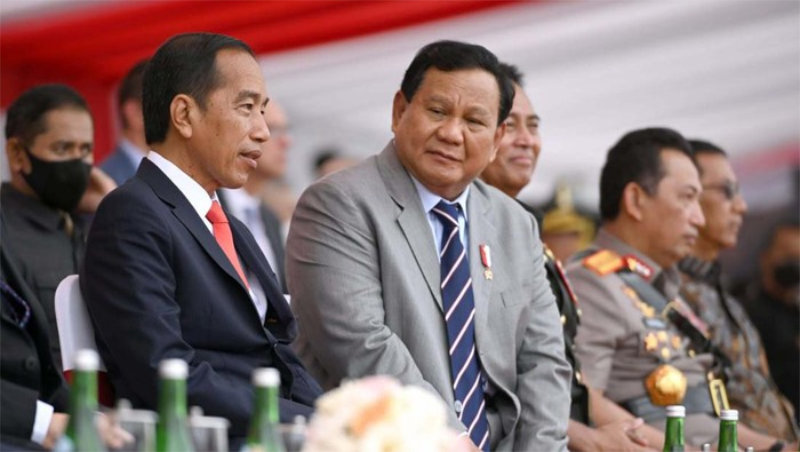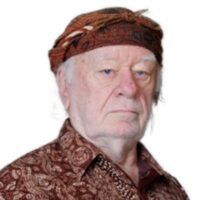Defence Minister Prabowo Subianto, who is hoping for third time lucky in next year’s presidential election, has recently been given the critical job of coordinating intelligence services by the incumbent, President Jokowi. Duncan Graham reports from Indonesia.
For Western observers – often oblivious to cultural reasoning – it seems like a loopy decision. The added responsibilitities is seen as a promotion for Prabowo (as he is known) and gives him access to international spy secrets and even greater prominence in the media.
So far that’s how it’s panned out, too. Prabowo’s Gerindra (Great Indonesia Movement Party) has leapfrogged to second place in the latest reliable poll of voters, though still far behind Jokowi’s Indonesian Democratic Party of Struggle (PDI-P in Indonesian terms).
Jokowi’s motivations are hard to understand. According to an analysis in the Jakarta Post, Jokowi is reportedly getting impatient with his party and its supreme leader, Megawati Soekarnoputri, to announce who will run for PDI-P. The Constitution precludes Jokowi from running for a third term. The promotion of Prabowo may well be Jokowi saying “hurry up” to his party, and to support his own preferred candidate, current Central Java Governor Ganjar Pranowo. It’s complicated.
Indonesia to elect a new president – but a queen will decide the leading candidate
Next year’s election will be Prabowo’s third charge at the most powerful position in Southeast Asia. A disgraced former three-star general, Prabowo is Indonesia’s version of Donald Trump, albeit better educated and intelligent, making him more dangerous. On the publicly-available evidence (he hasn’t responded to requests for an interview) he comes across as a volatile paranoid narcissist.
He denied he’d lost the 2019 election when the official results had him ten points behind. His supporters rioted in Jakarta. Eight were killed and more than 700 injured.
He also challenged the result in the Constitutional Court and lost. Jokowi became president and then made his furious rival the Defence Minister. This role gave him the power to negotiate arms deals overseas before Covid curbed flights, but also a platform in domestic politics.
Prabowo’s latest appeal to nostalgic electors seeking a toughie at the top is wanting army commands installed in Kalimantan province (Borneo), because “the natural resources of these regions (are) vulnerable to being stolen by other parties”. As usual when dog whistling, the real or imagined poachers haven’t been named.
Prabowo was a US-trained soldier who accelerated his career by marrying Titiek, the daughter of second president Soeharto. But even these contacts couldn’t stop his dishonourable discharge for “misinterpreting orders” during the 1998 chaos following his father-in-law’s resignation.
Prabowo’s international downfall was also linked to allegations of atrocities committed by troops he’d led in East Timor and Papua. For a while he was banned from the US because of alleged human rights violations.
His marriage fractured and he fled to exile in Jordan .Helped by his billionaire businessman brother, Hashim Djojohadikusoemo, he returned to build the Gerindra party as the vehicle for his born-to-rule ambitions.
Before Prabowo’s second stab at the presidency in 2019, award-winning US journalist Allan Nairn, who’d covered fighting in East Timor and been bashed by soldiers, said he’d seen plans to stage mass arrests of political opponents and restore the army’s leadership role it held under Soeharto should Prabowo win. The timing of the story made it suspect.
Prabowo has one son, Didit Hediprasetyo, a fashion designer and socialite who lives in Germany. Indonesian social media commentators sometimes daringly suggest that he’s gay, though this could be a fabrication to discredit his ultra-macho Dad.
In Australia, such scuttlebutt would damn this columnist for turning tabloid. However it’s relevant in Indonesian politics. A wave of LGBT hate sponsored by faith groups has been sweeping the nation and will be an issue in the campaign.
The nation’s foremost Islamic authority, the Majelis Ulama Indonesia (Islamic scholars) has issued a fatwa (religious edict) stating “sexual orientation towards the same sex is a disorder that must be cured.” Churches are also into vilification.
In Indonesia the marriage equality debate has nothing to do with same sex bonding. It means the prohibition of interfaith weddings – an issue distressing those who thought their country supported tolerance.
Prabowo is in a fix; if he bangs the deviancy drum too hard, son Didit or his mates might speak out.To ignore means getting offside with the moral panic. The present plan seems to pump xenophobia rather than homophobia; rather ironic as the suave Prabowo is comfy with the foreigners that he tells the mob to mistrust.
While it remains unclear what Jokowi’s motivations really are, the dissembling makes sense to those deep in Javanese culture. German-born Jesuit philosopher Dr Franz Magnis-Suseno, author of Javanese Ethics and World View, stresses that the Javanese value rukun (harmony), “to prevent the development of conflict-engendering emotions … The open expression of feelings is considered extremely bad taste.”
Incumbent and aspirant are both Javanese, though wide apart. Slim Jokowi, 61, always elegant in batik, is an archetypal low-key traditional poor-lad-makes good. He was raised on a riverbank in a rented shack. Dad Noto Mihardjo was a chippie.
Plump Prabowo favours safari suits. He’s from a rich distinguished family with revolutionary credentials. Schooled in London he speaks fluent English. Papa Soemitro Djojohadikoesoemo was a minister and economist who studied in the Netherlands.
And while “Conflict-avoidance” and “harmony” are not terms even hagiographers would link to Prabowo, how his aprroach marries with Javanese ethics is mystery to the unanointed. But the culture is hierarchical, giving the elite leniencies denied to the wee folk.
The left-right, socialist-capitalist divides that help Australians get a grip on politics are absent in Indonesia where nationalism and religion infiltrate all debates.. There’s little disagreement among the parties on economic,social and security issues. Vote buying is widespread.
The game of politics is played through personalities, not policies.
Should Prabowo win, our she’ll-be-right policies for dealing with Jakarta for the past two decades will be sent for recycling. In Canberra it will be the Year of the Headless Chook.
Duncan Graham has a Walkley Award, two Human Rights Commission awards and other prizes for his radio, TV and print journalism in Australia. He now lives in Indonesia.

